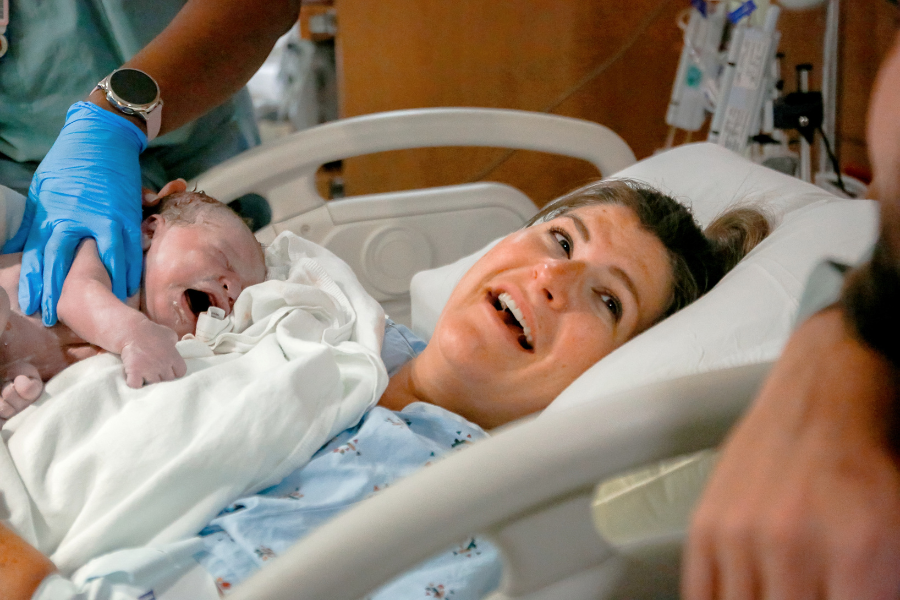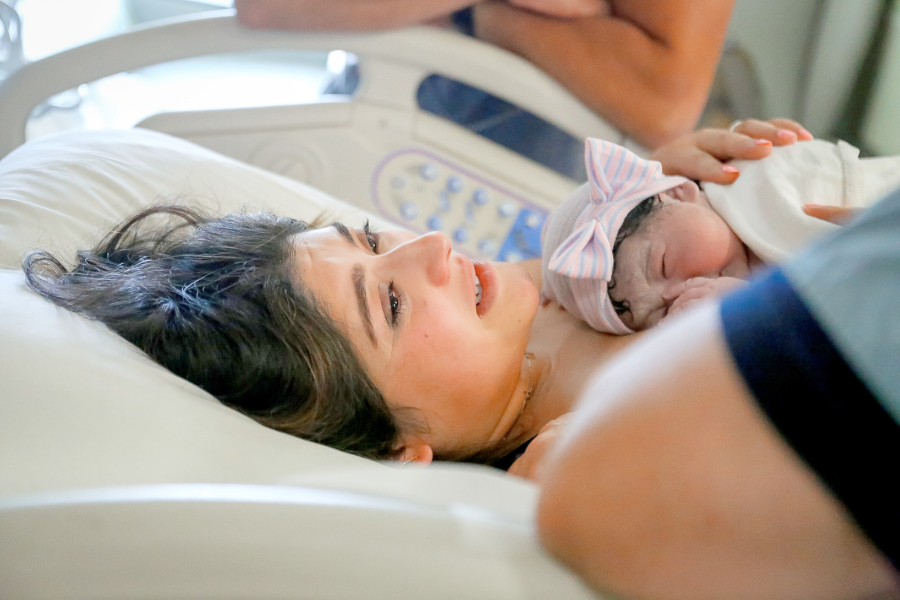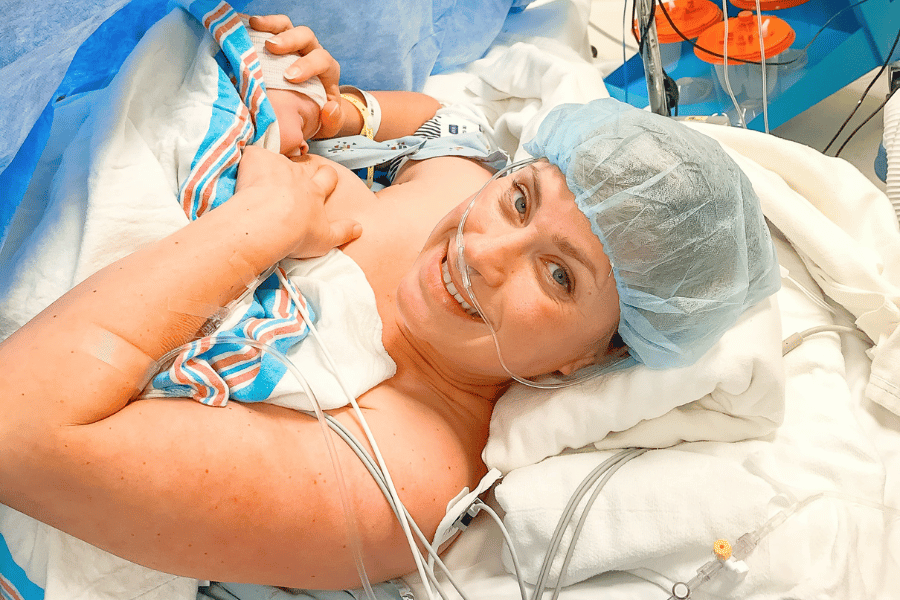Deciding how and when to stop breastfeeding is a question we will all face at some point in our nursing journey. And I suspect it comes at different times and looks a little different for everyone!
With my first, it was truly a combination of him telling me he was ready, and me coming to terms that I was ready to quit breastfeeding him as well.
It wasn’t emotionally easy, and there were a LOT of feelings!
As I was going through the weaning process, I knew I wanted to write about it! My hope is that if you’ve stumbled across this page, you’ll take away some valuable information I’ve learned.
Here we’ll cover when to stop breastfeeding your kiddo, how to stop breastfeeding your kiddo, and some helpful tidbits on the whole weaning process!
- When to stop breastfeeding? First…some breastfeeding benefits
- When should I start weaning?
- Gradual weaning vs immediate weaning (weaning cold turkey)
- Stopping breastfeeding early
- How to start weaning?
- How long does it take for milk to dry up?
- Can I start breastfeeding again once I've quit?
- What to do when weaning becomes difficult
- How did you know when to stop breastfeeding? Where are you at in the process?
Follow @mommy.labornurse on Instagram to join our community of over 640k for education, tips, and solidarity on all things pregnancy, birth, and postpartum!
When to stop breastfeeding? First…some breastfeeding benefits
First of all, congratulations to YOU, mama…
You’ve chosen to supply your baby with breast milk! Whether you’ve only breastfed for a few days in the hospital, or for 5 years, I applaud you. Breast milk has incredible health benefits for your baby (and you) that formula simply cannot compare to.
In the first few days after you’ve given birth, your breasts produce colostrum. Also known as LIQUID GOLD. This nutrient-rich substance is packed with a TON of amazing goodies that help you nourish your baby in his first few days of life.
Once your mature milk comes in, breast milk starts to change its look and its makeup. It becomes less GOLD and starts to look more white or opaque.
Mature breast milk contains very important ingredients, including cells that help strengthen baby’s immune system (immunoglobulins).
Additionally, there is resounding evidence that babies who are breastfed for six months or more:
- Do not suffer from as many childhood illnesses
- Have a much lower rate of SIDS
- Lower rates of respiratory illnesses, obesity, ear infections, and gastrointestinal diseases (source)
Benefits of breastfeeding for mom
In addition, breastfeeding can help YOU too! Breastfeeding offers ALL of these amazing benefits for you, mama!
- Reduced risks of breast and/or ovarian cancer later in life
- Faster recovery time from delivery, decreased postpartum bleeding, and an increase in uterine shrinkage
- Helps to extend the time between pregnancies by delaying your menstrual period
- Some studies have found that breastfeeding may reduce the risk of developing type 2 diabetes, rheumatoid arthritis, and cardiovascular disease, including high blood pressure and high cholesterol.
Breast milk is truly amazing! And, again, I am so proud that you chose to breastfeed your baby for AT LEAST some time in his life.
But I know that if you’re here, you’re on the path to weaning. Or at least THINKING about weaning. So let’s discuss when to stop breastfeeding.
When should I start weaning?

Okay, so first of all…let’s get at what WEANING actually is. You technically begin the weaning process the day you first give your baby food from a source other than your breast!
Weaning is the slow replacement of breast milk with other foods and methods of nurturing. The key word here is sloooooow.
Most babies start receiving solids somewhere around the 4-6 month time frame. And, it’s much more common nowadays to wait until your baby is a FULL 6 months before you introduce solids.
Related Reading: How to Relieve Pain While Breastfeeding
How long should you breastfeed?
Always remember, breast milk or formula should be baby’s main source of nutrition up until 12 months of age.
The American Academy of Pediatrics (AAP) and the World Health Organization (WHO) both recommend exclusive breastfeeding for a baby’s first 6 months. AAP then recommends breastfeeding alongside solid food for one year total or longer.
AND, WHO recommends continued breastfeeding along with appropriate complementary foods up to 2 years of age or longer. (source)
Once baby reaches his/her first birthday, it’s completely up to you (and baby) whether you want to start the FULL weaning process. Many moms think that the 12-month mark is set in stone, but quite frankly, it’s not.
Two important things about when to stop breastfeeding
Let’s remember two important things about WHEN to completely stop breastfeeding:
YOU have to be ready.
And…
Baby has to be ready.
This means…NEVER try and wean a sick or teething baby…OR, don’t stop breastfeeding because someone is pressuring you to do so.
Are you happy with breastfeeding your child? Is your child happy breastfeeding? Then, no need to wean!
Benefits of breastfeeding a toddler
It’s completely false that breast milk serves no benefit to a child after his/her first birthday. If you are still producing milk, your baby is STILL getting valuable milk properties.
In fact, the fewer breastfeeding sessions you have with your baby per day, the more concentrated the antibodies are contained within your milk! Isn’t that awesome?
So, that means baby is still getting a LOT of great benefits, even if you only nurse once or twice a day!
All children reach an age to be ready for weaning at different points in their lives. Some may be ready at 12 months, some at 18 months, or some at 3 or 4 years of age. Many children continue to nurse well past their first birthdays if they are able to pace themselves, and wean when ready.
It’s about finding a balance for what works for BABY and YOU!
Gradual weaning vs immediate weaning (weaning cold turkey)
Ideally, gradually weaning your baby from breastfeeding is easiest on you AND baby. But, sometimes moms need to wean pretty quickly for multiple reasons:
- Starting a new medication: There are certain prescription medications that are unsafe to take if you are breastfeeding. Ideally, you should discuss with your doctor if there are any alternatives you may take during the duration you plan to breastfeed. If this is not an option, immediate weaning is necessary
- Hospitalization/surgery/major illness: Unfortunately, major health events certainly happen, and if you find yourself hospitalized for an extended period of time you may need to immediately wean your child.
- Pregnancy: Many women continue to breastfeed well into their second pregnancies, however, some women find it difficult to do so. Breastfeeding also causes your uterus to contract, so if you have a high-risk pregnancy, your doctor may recommend you wean. It’s best to always consult your doctor if you have any questions!
Related Reading: How to Choose The Right Formula for Your Baby

Tips on weaning cold turkey
Immediately weaning is not an easy task! Your boobs will most likely feel like they are big fireballs until your milk gradually dries up.
Weaning this way can cause you to feel extremely engorged, uncomfortable, and you are at a much higher risk for developing mastitis.
Immediately weaning also comes with risks of breast abscesses, infections, and clogged milk ducts.
How long does it take for milk to dry up?
Your breasts will also continue to leak milk for quite some time after you completely stop breastfeeding. Some women report leaking for a few weeks post-wean, others report as long as 6 months.
Tips for YOU when weaning cold turkey
- It’s okay to remove a bit of milk from your breasts during the immediate weaning process. This can be done with a hand pump, but only remove enough so you do not feel uncomfortable anymore. If you completely empty your breast, you’re telling your body to “keep making milk”. Do the best you can to remove as little as you can without feeling like you are going to completely explode…
- Make sure you wear a bra that is supportive, but not restrictive. Gentle support is helpful, but if your bra is too tight, you are a much higher risk for developing an abscess or clogged milk ducts
- Many women find that frozen cabbage leaves help to decrease the pain associated with weaning AND help to dry up milk in the process. Cabbage leaves are great because they are already shaped like boobs! Stick a few in your freezer for a few hours, and then put them right in between you and your bra (they will be really cold at first!)
- It’s also important to keep breast pads near you at all times. You will be super leaky at first while your milk is drying up. The sound of a baby, or any sort of warmth near your boobs may cause you to leak, so make sure you stock up and keep them with you at all times!
- Weaning immediately can be very painful, so make sure you talk to your doctor about what pain medications are safe during the weaning process. Unless medically contraindicated, alternating Motrin and Tylenol around the clock works really well for pain!
- Think about you too…it can be very psychologically hard to immediately wean your baby. Weaning comes with a LOT of feelings (regardless of if you do it immediately or gradually). It’s important to have a support system in place, and talk to friends/family if you are feeling sad!
- Additionally, the hormone shift you experience when immediately weaning can be difficult if you have a history of depression or mental illness. Make sure you speak with your doctor if you have this medical history, so you both can make a plan of the best way to tackle weaning!
Stopping breastfeeding early
Stopping breastfeeding your baby early (before their first birthday) can be due to a number of things!
- Some mamas return to work as early as 8-12 weeks after giving birth and find it virtually impossible to pump at work (which is a TOTALLY failure of our system…but I digress)
- Other moms find it difficult to continue breastfeeding their newborns because of latching issues, or milk supply issues, and turn to formula.
- Other moms just find that formula is what works best for them, and they resort to bottle feeding because of convenience, pressure from others, public embarrassment, frustration, or a combination of many other factors!
What I am getting at is….stopping breastfeeding your baby early is not what AAP or WHO recommends. It’s not what I recommend either…BUT if you do, it’s okay mama!
I know how hard breastfeeding is, and I completely understand the pressure it is to breastfeed these days!
If you feel you need to quit, I encourage you to talk to your support team FIRST (your friends/family), and then come to a decision that’s best for you and your baby!
Remember that breastfeeding doesn’t have to be all or nothing. I personally supplemented breastfeeding with formula from early on and still breastfed my first for 19 months! So believe me, I am NOT anti-formula at all. YOU CAN DO BOTH!
Related Reading: Back to Work After Maternity Leave: Tips for a Smoother Transition
How to start weaning?
When you’ve decided it’s time to wean your baby, I encourage you to follow the ONE FEED PER WEEK ROUTINE!
It works, and it’s the BEST way to gradually reduce your supply without putting yourself at risk for engorgement or mastitis. It also helps transition baby SLOWLY and it’s much more gentle on the baby who is boob-obsessed!
Here’s how it works (it’s basically how it sounds, haha):
- Calculate how many feedings you have with your baby, and subtract ONE FEED per week.
- So, if you currently feed your baby 8 times per day, it should take you about 8 weeks to FULLY wean!
- Always start dropping feeds that your baby is least attached to FIRST (usually feeds during the daytime)
- Sometimes women find it easier to work down to 2-4 feeds per day quicker (by dropping a feed every 4-5 days), and then finding it more time consuming and difficult to give up those last few feeds
- All in all, do what’s best for baby and for YOU! If you know baby is going through a rough patch, he’s teething, or you are traveling etc. save that wean week and give it up once baby returns to his happy self!
How long does it take for milk to dry up?
Generally, the longer you have been nursing, the longer it will take your milk to completely dry up. So, if you decide to give up breastfeeding your newborn, you should expect your milk to dry up in a few days, up to a few weeks.
Consequently, if you wean your 2-year-old, you may not completely dry up for months. Some women find that in the shower, they are able to still hand express small amounts of milk, months after breastfeeding has stopped.
It really just depends on your body and the amount of estrogen circulating as well! Also, some medications (such as decongestants or birth can cause a woman’s milk supply to dry up much faster!
Can I start breastfeeding again once I’ve quit?
What if I change my mind?!?!
It’s totally possible to relactate once you quit breastfeeding! Once again, it will depend on how long you’ve breastfed your baby in the first place, and how long ago you weaned.
A woman who has breastfed her baby for 8 months and only stopped one week ago will have a much higher likelihood to regain her milk supply than a woman who breastfed her baby for only a few weeks and wants to restart again after a few months.
Related Reading: Can Breast Milk Come Back After Drying Up?
Nurse like their a newborn again
If you find yourself having second thoughts, the best thing to do is to put baby to breast again! Sometimes mamas want to breastfeed again, but babies have other plans!
After not breastfeeding for a few weeks/months, your baby might be very confused if you try to stick your boob in his mouth. He may not be interested in it at all! Keep this in mind, if you decide you’d like to breastfeed again.
If baby is gung-ho for milkies, it’s best to start breastfeeding as much as possible if you truly want to regain your milk supply! You almost have to treat baby as a newborn again, for your body to get the idea that it’s supposed to make milk. This means putting baby to breast at least 8-12 times per day.
Use your pump to help rebuild your supply
If baby is not too keen on breastfeeding this much, you can pump for 20-30 minutes during those additional feedings. This way you’ll have the best shot at regaining your milk supply!
Pumping will also help you to see if you’ve made any progress! If you pump for one or two of those feedings, you’ll be able to see if you are starting to make milk again.
Audible swallowing and fresh milk in baby’s mouth and on your nipple are also good ways to tell if your milk is starting to pick up!
Use some known milk supply boosters
Additionally, I would recommend trying some milk supply boosters…this includes foods and/or herbs that are designed to help increase your milk supply! Mommy Knows Best cookies are my faaaaaavorite.
I’ve written a whole article about things I did to increase my milk supply here!
What to do when weaning becomes difficult
By the time a baby is walking and talking, nursing tends to be less about nutrition…and more about comfort. Nursing before bedtime or upon awakening can be especially tricky for toddlers to give up.
If this is something baby is used to doing every day before bed (or as a slow start to the morning), completely cutting it off one day can make your toddler go nuts.
Here are a few tips to help wean a stubborn toddler…
- Establish a “new” thing you do during your bedtime routine as a means of replacing that nursing session. For us, it was turning out the light after books, and a special bedtime song with mommy.
- Distraction is your friend. A distracted toddler has a hard time nursing
- Consequently, if your toddler INSISTS on nursing, try a bargain. Say, “Yes we can nurse, but first let’s read your bedtime book.” Sometimes distracting your toddler with an activity, can make that nursing session disappear!
Related Reading: Milkology…Take a Breastfeeding Bootcamp!
How did you know when to stop breastfeeding? Where are you at in the process?
How was your weaning experience? Mine was with all the feels! Weaning can be so emotional on mamas, and it’s important to realize this!
I was only nursing my son once before bedtime when I weaned him a few weeks ago, and I cried when I realized it was our last session!
Weaning not only signifies that you are no longer a milky mama, but it also is a crazy way of telling you that your baby is growing up. This was what was so hard for me, and so hard for many moms!
When I realized that I was not going to be nursing him anymore, it totally hit me that I had A KID! I saw my little newborn baby in my arms, and suddenly he looked so big!
Like I said…all the feels!
Happy Weaning!





